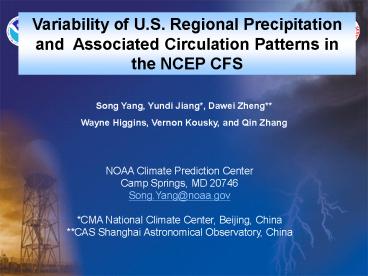A Look at Climate Prediction Center - PowerPoint PPT Presentation
Title:
A Look at Climate Prediction Center
Description:
Variability of U.S. Regional Precipitation and Associated Circulation Patterns in the NCEP CFS ... T126 100-year free run. T62 50-year free run ... – PowerPoint PPT presentation
Number of Views:13
Avg rating:3.0/5.0
Title: A Look at Climate Prediction Center
1
Variability of U.S. Regional Precipitation and
Associated Circulation Patterns in the NCEP CFS
Song Yang, Yundi Jiang, Dawei Zheng Wayne
Higgins, Vernon Kousky, and Qin Zhang
NOAA Climate Prediction Center Camp Springs, MD
20746 Song.Yang_at_noaa.gov CMA National Climate
Center, Beijing, China CAS Shanghai
Astronomical Observatory, China
2
Motivations and Strategies The variations of
precipitation on different timescales are
associated with different physics and the
performance of CFS in simulating these variations
is timescale dependent Investigate the
time-frequency features of the modeled
precipitation and circulation patterns for the
timescales of realistic and erroneous simulations
to understand the causes of successes and
failures
3
Observations and Model Output Observations CPC
precipitation reconstruction data (Chen et al.
2002) NCEP-NCAR reanalysis winds NOAA extended
reconstructed SST CPC Unified precipitation CFS
Output T126 100-year free run T62 50-year free
run
4
Precipitation Diff
T62-Obs
T126-Obs
T126 simulates the annual and seasonal mean
precipitation better (than T62)
5
Diff in Seasonality of Precip (Wash Lawler 1981)
T126-Obs
T62-Obs
T126 simulates the seasonality of precipitation
better (than T62)
6
Mean Annual Cycle of Regional Precipitation
SW
7
Relations of SW Precip to SST 850-mb Winds
Obs
CFS
8
Obs
CFS
9
Mean Amplitudes and Phases (SW Precipitation)
Obs Obs Obs CFS CFS CFS
Period (yr) Amplitude (mm) Phase (yr) Period (yr) Amplitude (mm) Phase (yr)
0.50 5.27?0.29 0.07?0.01 0.50 4.00?0.43 -0.04?0.01
1.00 9.07?0.29 -0.32?0.01 1.03 1.47?0.43 -0.10?0.05
2.01 1.02?0.29 -0.06?0.09 2.04 1.31?0.43 0.68?0.11
3.27 0.63?0.29 -0.14?0.24 3.69 1.29?0.43 -1.64?0.20
12.05 0.87?0.29 3.72?0.65 10.87 1.23?0.43 -2.44?0.61
Linear rate 0.010?0.013 mm/yr Linear rate 0.010?0.013 mm/yr Linear rate 0.010?0.013 mm/yr Linear rate 0.008?0.018 mm/yr Linear rate 0.008?0.018 mm/yr Linear rate 0.008?0.018 mm/yr
RMS 5.40 mm (9.21 mm, 41) RMS 5.40 mm (9.21 mm, 41) RMS 5.40 mm (9.21 mm, 41) RMS 7.94 mm (8.57 mm, 7) RMS 7.94 mm (8.57 mm, 7) RMS 7.94 mm (8.57 mm, 7)
10
Relations of SW Precip ANN with SST 850-mb Winds
SW
Obs
CFS
The features associated with the annual cycles of
SW precipitation are so different
11
PW
Obs
CFS
(It is much better for the Pacific West domain!)
12
Relations of SW Precip Inter-ANN with SST
850-mb Winds
SW
Obs
CFS
CFS also overestimates the interannual
relationship for SW precipitation
13
DJF- and MAM- SSTs/Winds and JJA0 SW Precip
Obs
CFS
DJF-
MAM-
JJA0
14
Same problem with the NAME Tier-1
precipitation Two peaks in CFS
15
Obs
CFS
Same problem with the NAME Tier-1 precipitation
16
SW
NAME Tier-1
Consistency between CPC reconstructed unified
data
17
- Summary
- CFS T126 simulates the means and seasonality of
U.S. regional precipitation better than does CFS
T62 - The worst CFS simulation occurs to the SW
precipitation - The CFS generates (completely) unrealistic
amplitude and phase of the annual cycle of the SW
precipitation - The CFS overestimates the interannaul
variability of the SW precipitation and its link
to the Pacific SST and winds, but underestimates
the precipitations connection to the Atlantic
SST and atmospheric circulation































